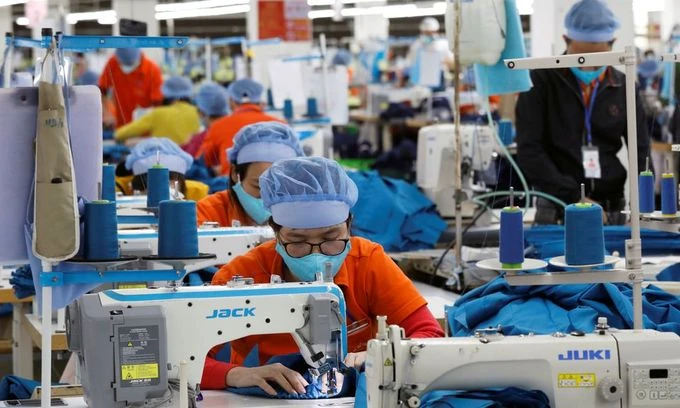
Speaking with Saigon Investment, Dr. NGUYỄN ĐÌNH CUNG, an economist and Director of the Central Institute for Economic Management, and former member of the Economic Advisory Group of the Prime Minister of Vietnam, stressed that traditional stimuli like the fiscal or monetary policies have lost their advantages, hence it is vital to remove unnecessary barriers and improve the legal system to pave the way for more investments and business activities. This should be the last step in promoting stronger economic growth.
JOURNALIST: - Sir, the Government estimates that the GDP growth rate in 2022 will reach about 8%, which is the highest in the world, and higher than the expected target of 6.5%. What is your opinion about the actual situation and prospects for the future?
Dr. NGUYỄN ĐÌNH CUNG: - This is a pretty high target, but we must set a higher target so that we will make enormous effort to reach it. It is true that we have reached a year-on-year GDP growth rate of 8.83% over the last nine months of 2022, but that is compared with a low growth rate in 2021. In this complicated scenario with so many uncertainties and unpredictability around the world, we must stay calm and look at the real picture of the economy in 2022 from a more comprehensive point of view.
The situation may look positive, but we should not be overconfident as the global economic future looks gloomy. Monetary tightening in many countries has continued and this situation may last far into 2023. Inflation is still high and continues to persist, while there is no sign of improvement. The value of the US dollar continues to rise as other currencies continue to suffer depreciation. The Russia-Ukraine conflict is escalating by the day and China is very likely to extend its zero Covid policy for its population.
In our country, some situations are getting worse than before as adverse effects from outside are beginning to penetrate into our socio-economic system more rapidly and on a larger scale. Inflation is at risk of soaring, and the exchange rates are in danger of rising, putting greater pressure on inflation. Deposit and loan interest rates are on the increase. Foreign reserves have dwindled by 20% because intervention efforts were made to stabilize exchange rates. Feelings of insecurity and instability are widespread in the stock market, and trust is on the decline. This situation may last long and for many years because the basic causes are coming from outside the markets and affecting the economy.
- Sir, your analysis shows that growth rates will slow down because of negative impact coming from outside. Is this correct?
- Adverse factors from outside will continue to last for many years. It is predicted that in 2023 the world is very likely to fall into a recession with very high inflation, causing consumers and import demand to shrink. This will directly create negative effects on our production and export businesses in the fourth quarter and throughout the year of 2023.
Although the economy is recovering, the business community is still confronted with countless difficulties. Orders for items generally drop suddenly and cause serious issues for businesses. Corporate businesses and production activities are facing knotty problems because it is very hard or even impossible to access loans now with credit interests very high. Production costs are also skyrocketing due to direct impact of the increase on exchange rates.
The fiscal and monetary policies are focused on stabilizing the macroeconomic situation, with a high priority given to combat inflation, making it difficult to promote economic growth. Considering the growth drivers, domestic demand will decrease due to tightening of spending by consumers. Previously huge profits from the real estate and securities sectors were partly shifted to such things as cars, luxury goods and holiday trips. Other worrisome aspects include decreasing investment demand and decelerating of exports.
- Sir, some members of the National Assembly have mentioned the need to proactively respond to the worst-case scenario when the world falls into an economic crisis. What do you think we should do now to prepare for such a situation?
- First, all we can do to promote growth is to raise public investments and courageously open our doors to international tourists. This is the immediate salvation. In addition, we must satisfactorily carry out the program of economic recovery and growth, but it is also necessary to consider giving up or changing the target and scope of the interest rate support package. It is also essential to continue to support and facilitate trade activities, especially at the Vietnam-China border gates in general and export of farm produce and agricultural products to China in particular.
Second, at the macroeconomic level, it is vital to continue to give top priority to controlling inflation at a reasonable rate, which depends heavily on market development and objective factors beyond the government’s control. It is also imperative to manage the exchange rates according to market changes, by flexibly adjusting the rates while taking into consideration both the central exchange rates and margins. The monetary policy should be tight but must be able to eliminate bottlenecks in liquidity to ensure markets have a liquidity flow.
Third, it is important to restore public trust in the market and among investors. It is crucial that we restore trust and motivate our civil servants and state agencies. Government officers need to be encouraged to work without fear and avoid making mistakes that recently hampered significant efforts to achieve socio-economic development goals. Also, it is necessary to raise credibility among investors so that they discard feelings of insecurity, instability and bewilderment of the Vietnamese market and have more confidence to make lucrative investments in the future.
- Thank you very much.




















